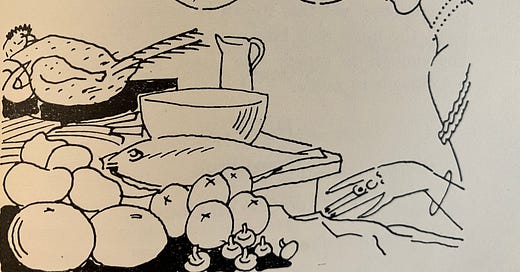‘In cookery, more than in anything else, we see clearly the errors of the past, and each generation is ever ready to criticise, most of the time with reason, what the other generations have done.’
So wrote Xavier Marcel Boulestin in 1937 in his book The Finer Cooking or Dishes for Parties, ‘with decorations by J.E.Laboureur.’ The volume in my collection is the one he said should stand among the cookery books in the hostess’s library. The recipes in the back are numbered and correspond to the same numbered recipes in the smaller companion volume intended for the cook.
Seventeen short chapters provide some culinary history and give light hearted advice to the hostess on how to entertain with style and good taste. She did not, of course, need to know how to cook but could follow the menus suggested and rattle off the instructions to the cook, presumably just quoting the recipe and corresponding page number. My copy is in pristine condition. Perhaps the kitchen copy, greasy and gravy stained has not survived in the second hand book market.
Boulestin went to say
‘If we read cookery books (an amusing and virtuous occupation) of all ages we find that the old ones are more interesting than useful; but they throw a light on the modes and manners of a period, and help us to visualise life in those bygone days.’
One chapter reminds the hostess that it is not entirely impossible to produce a meal and gives a step by step guide to a simple three course supper …
The hostess might also find guests required feeding after a night out on the town, a late supper or and early breakfast might need to be produced long after the staff had retired to their beds ….
The first of the specimen menus he offers details the dinner given to H.R.H. The Prince of Wales at the Restaurant Boulestin, 5th December 1935.
Huitres
_____
Potage Germiny
______
Bécasse flambée
Pommes soufflées
______
Souflée au Grand Marnier
Vins
Rauenthaler Rotherberg Hochfeine Auslese 1933
Grand Chambertin 1919
A few oysters to start, followed by a creamy sorrel soup, roast woodcock with deep fried potatoes and then a light soufflé probably made a very acceptable light dinner for a prince reportedly reluctant to eat properly, obsessed with the thinness of his legs, possibly verging on anorexia.
Boulestin enjoyed a varied career as a writer and owning interior design shops in London. It was the success of his first cook book that led him to the restaurant business. Restaurant Boulestin in Southampton Street, Covent Garden was called ‘the prettiest restaurant in London’ by Cecil Beaton. Decorated with circus themed murals by Laboureur and fabrics by Raoul Dufy, it was said to be the most expensive in town.
I wonder if Wallis Simpson was amongst the guests at that dinner? Certainly that Christmas the couple exchanged expensive gifts and within weeks, in January 1936, the King had died and Edward had insisted that Wallis be by his side at the ceremony of his proclamation by the Garter King of Arms. She was still married to Ernest. The scandal of their relationship and the abdication crisis were to unfold over the following year.
By 1937, Boulestin had become the first TV chef broadcasting to the select few who could afford the equipment to watch those early broadcasts by the BBC. He never gave up his French citizenship and when the Nazis invaded he and his friend and partner, Robin Adair, were in their holiday home in Les Landes. Robin was ill, unable to flee and interned as an enemy alien. Marcel moved to Paris to be closer to him and that is where he died, aged 65 in September 1943.
It was in July of 1939 that the young Elizabeth Gwynne, aspiring actress, sailed to France with her lover. She too was caught up by the invasion and by 1940 was learning to cook the food of the Mediterranean on the Riviera. She sent home for a replacement copy of Boulestin’s book amongst others. It was as Elizabeth David that she later wrote in praise of his cuisine, ‘his intelligence, sense and taste…’
But that is a story for another time…..






Beautiful illustrations